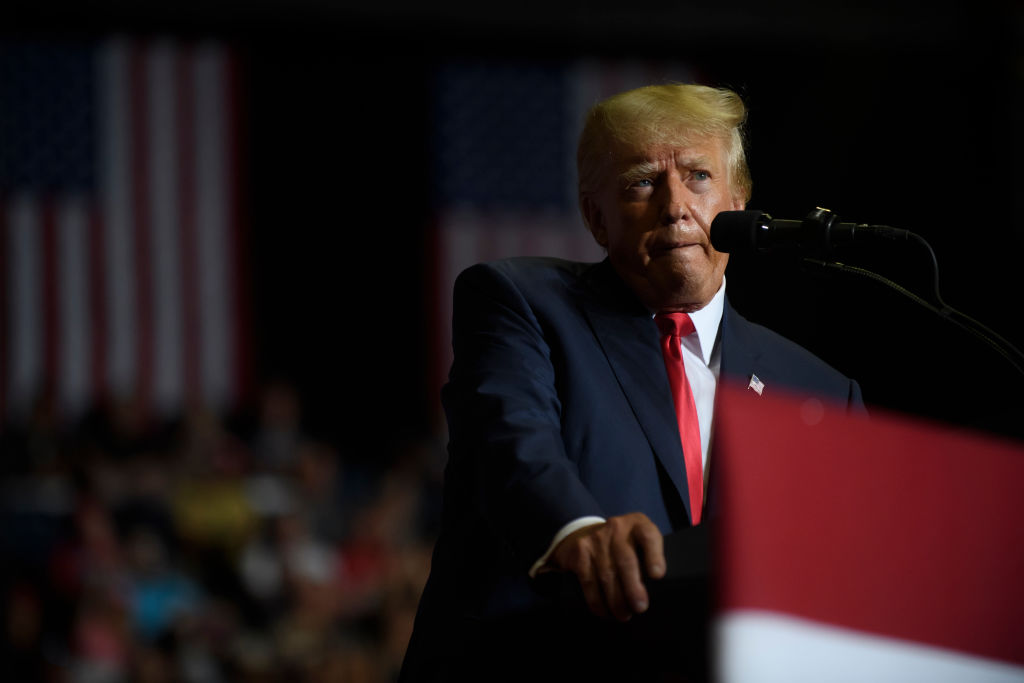The special master overseeing the review of documents seized in the FBI raid of former President Donald Trump’s Mar-a-Lago estate indicated Tuesday that he was not pleased with the responses of Trump’s lawyers on the question of whether documents seized were classified.
The hearing was the debut of special master and federal Judge Raymond Dearie, who was selected for the job by U.S. District Judge Aileen Cannon after Trump sought to block the Justice Department from reviewing the documents that were seized, according to the New York Post.
Dearie said that because his role as special master is in a civil case, Trump has to make the successful case that the Justice Department should not be able to review the documents, Politico reported.
On Tuesday, the judge and Trump’s lawyers clashed on the issue of whether Trump, as he has claimed, declassified the documents.
In summarizing Dearie’s position in Tuesday’s hearing — which was held in Brooklyn, New York — The New York Times wrote: “While Judge Dearie was open to the notion that Mr. Trump’s lawyers might at some point mount a declassification defense, he seemed displeased that they were casting doubt on the government’s assertions about the classification status of the documents without backing up their claims with evidence.”
Or as Dearie said in court to Trump’s lawyers, “My view of it is: You can’t have your cake and eat it,” according to Politico.
Although Dearie was one of Trump’s two picks for the role, and the only one acceptable to both sides, he demonstrated Tuesday that he had concerns about the Trump legal team’s inability to give a definitive answer on the issue of declassifying the documents.
“I can’t allow litigation strategy to dictate the outcome of my recommendations to Judge Cannon,” Dearie said.
Dearie said if the Justice Department said documents are classified and the Trump side offers no facts to dispute that, “as far as I’m concerned, that’s the end of it,” he said, according to the Post.
James Trusty, an attorney for Trump, suggested it was “premature” to decide that at this time, Politico reported.
“It’s going a little beyond what Judge Cannon contemplated in the first instance,” he said.
“I was taken aback by your comment that I’m going beyond what Judge Cannon instructed me to do,” Dearie replied, adding, “I think I’m doing what I’m told.”
Trusty said Trump should not be forced to tip his hand about a legal defense should criminal charges be filed.
“It’s not about gamesmanship. It’s about not having seen the documents. … We are not in a position, nor should we be in a position at this juncture, to fully disclose a substantive defense,” Trusty said. “We shouldn’t have to be in a position to have to disclose declarations and witness statements.”
The Trump team asked Dearie to push forward to get security clearances for all who might need to review a trove of 100 documents the Justice Department has said are classified, with Dearie saying that may not be necessary.
“It’s not just a matter of having the clearance. It’s a matter of need to know,” Dearie said. “If you need to know, you will know.”
“It’s kind of astounding to hear the government say the president’s lawyers don’t have a need to know,” Trusty said.
The Brooklyn hearing is part of a larger legal battle in which the Justice Department is seeking to block part of Cannon’s order setting the rules for the special master’s review in order to prevent Trump’s team from reviewing documents the Justice Department does want Trump’s lawyers to see, citing their sensitive nature, according to The Washington Post.
During the special master’s hearing, federal prosecutors said that should they fail in that effort, the case will to the U.S. Supreme Court.
A document from the Trump side in that hearing summarized the Trump team’s approach to whether the documents are classified, according to the Times.
“The government again presupposes that the documents it claims are classified are, in fact, classified and their segregation is inviolable,” the document said. “However, the government has not yet proven this critical fact. The president has broad authority governing classification of, and access to, classified documents.”
This article appeared originally on The Western Journal.

























 Continue with Google
Continue with Google